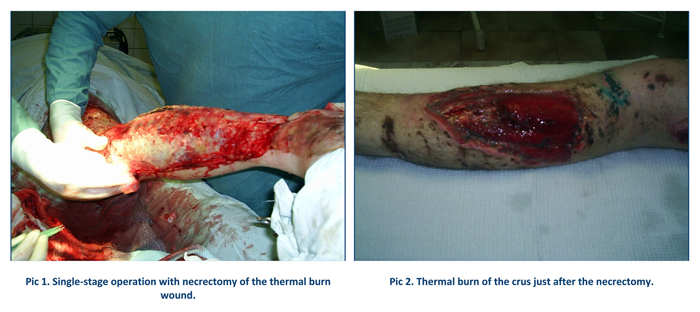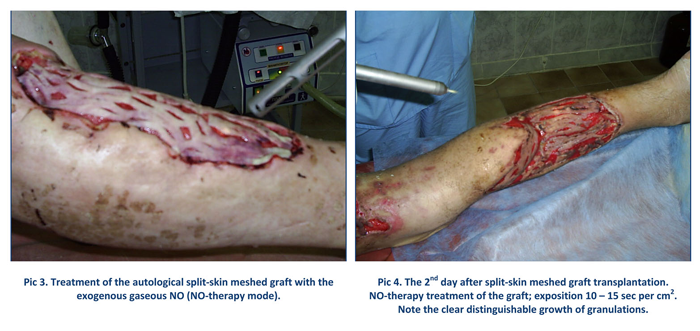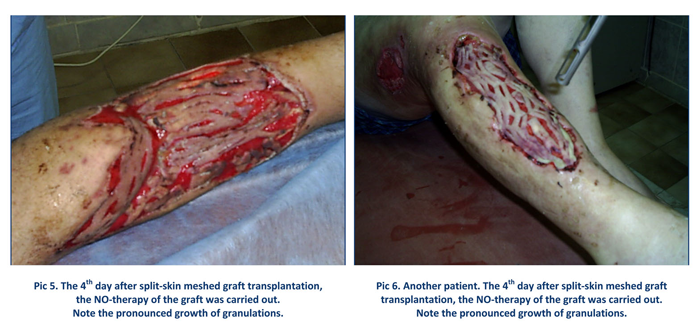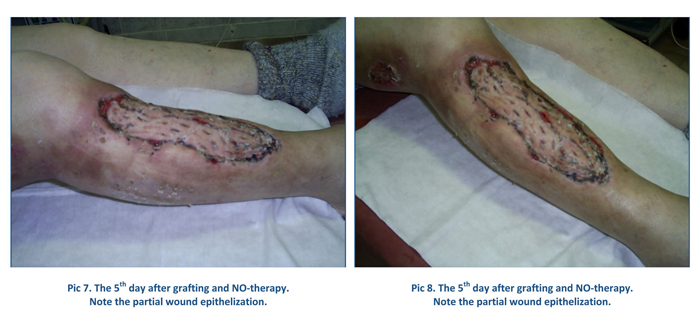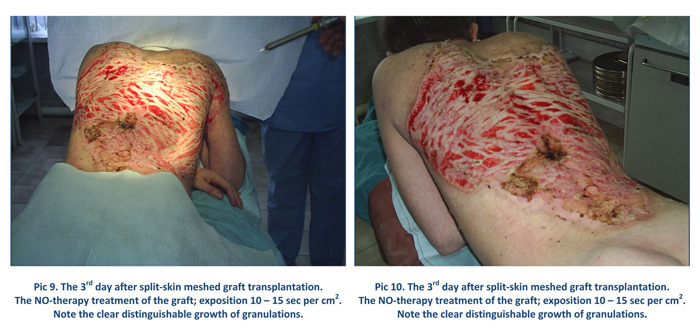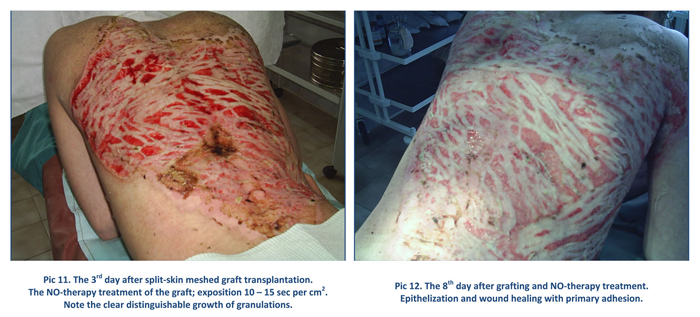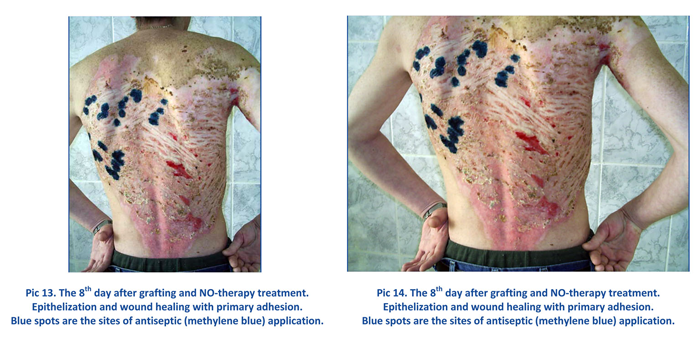1. Application of exogenous NO and air plasma in the treatment of the trophic ulcers of the vascular etiology PDF
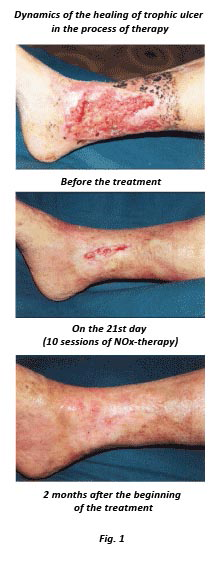
Clinical experiments showed the high efficiency of NO- therapy during the treatment of the following widely widespread diseases of peripheral vessels:
1) the chronic venous insufficiency of lower extremities (CVILE), complicated by the formation of trophic defects (the so-called “venous” trophic ulcers);
2) chronic critical ischemia of the lower extremities (CCILE) against the background of the chronic occlusion diseases of the arteries of lower extremities.
2. The NOx-containing gas flows in the treatment of the ulceronecrotic defeats of feet in the patients with diabetes mellitus PDF
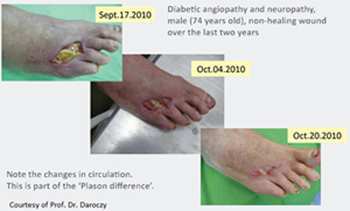
Syndrome of diabetic foot (SDF) - one of the most common complications of diabetes mellitus, which is developed approximately in 15% of patients with this illness.At present it is reliably known that under the conditions of prolonged hyperglycemia is developed the entire cascade of the metabolic disturbances, whose totality specifies the significant oppression of the production of the endogenous oxide of nitrogen. Scarcity endogenous NO in the patients with diabetes mellitus causes the disorders of the neuroregulatory influence of somatical and autonomous nervous systems (diabetic neuropathy) and disturbance of microcirculatory functions. The totality of these factors contributes to the appearance of the ulcerous defects of feet, and the connection of second infection leads to the development of purulent complications and synchronization of process.
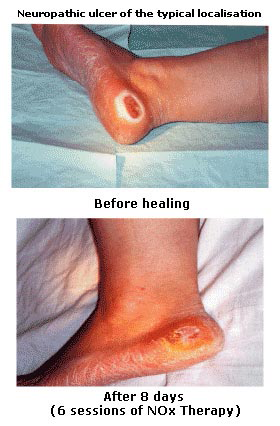
Already from the first sessions the decrease of inflammatory manifestations distinctly was noted, the expressed reduction in the intensity be ill, was activated the purification of the surface of ulcerous defect. The beginning of the forming of granulations on the average was fallen to the 4th day from the beginning of therapy. The boundary epithelization (expansion of epithelial rim from it was boundary wound on the average on 1-1,5 mm of every 3-4 days) noticeably was accelerated. The expressed positive dynamics was observed after 10 sessions in all patients: the sizes of ulcerous defects were reduced to 1/3 - 1/4 from the initial value. At 5 patients with the ulcers (with an initial diameter of 0,5-0,8 cm) small according to the size total epithelization began through 6-8 sessions of NO-therapy. The reduction of the I phase of wound process on the average on 3-4 days was noted, The II phases - on 4-5 days. As a result the periods of stationary treatment and clinical recovery of patients noticeably were shortened.
In the process of treating any side effects from the application of NO-CGF it was not observed.
Use of exogenous NOx and air plasma in the treatment of the pyoinflammatory diseases of soft tissues PDF
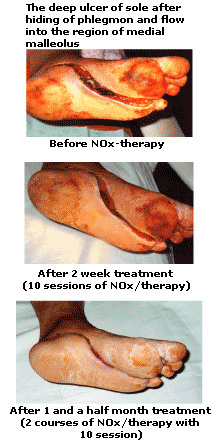
The use of an NOx-therapy with the ulcerous and pyoinflammatory forms of SDF led to the fact that perifocal inflammation and edema of cloths around the ulcerous defect already after the first sessions noticeably decrease. Especially clearly this was expressed in the group of patients with the pyoinflammatory complications of diabetic foot. With the ulceronecrotic defeats approximately to 7 days from the beginning of treatment they observed the purification of ulcerous surface from the pyonecrotic impositions and the decrease of purulent discharge. To 14 days from the beginning of treatment in 50% of patients the surface of ulcer was carried out by bright granulations and was noted the expressed boundary epithelization. To the completion of the course of treatment - to 18- 21 days in 67% of patients is noted the total epithelization of ulcerous defects, in rest - decrease of sizes of ulcer to 75-80% of the initial level.
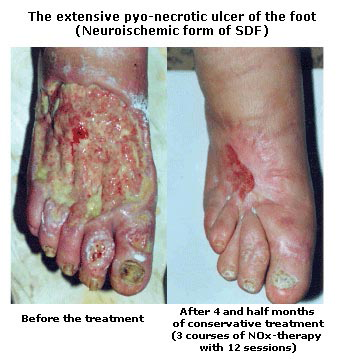
Thus, taking into account the key role of the scarcity of the nitrogen oxide in the disturbances of nervous and vascular trophicity, and also indirected by this the oppression of cellular proliferation, the distortion of morphogenesis and the torpid flow of reparative regeneration, that determine the development of the syndrome of diabetic foot, the method of exogenous NOx-therapy with the use of an apparatus “PLASON” is pathogenetically substantiated. The made observations make it possible to optimistically estimate its clinical significance
3. Application of an apparatus “PLASON” in the treatment of wounds, wound and beam pathology in the oncologic patients PDF
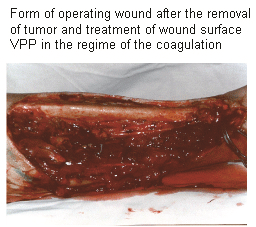
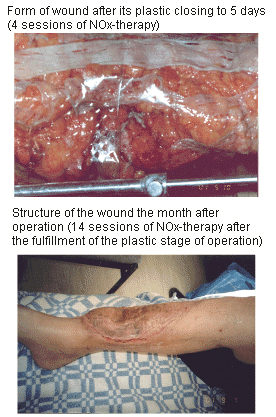
Higher risk of the development of postoperative complications (wound infection, the prolongedly unhealing wounds and other) by oncologic patients - 74,1% against 25,9% of patients, who did not have oncologic disease is convincingly shown in the classical work of E. Lohde with co-auth. (1993). The frequency of complications is connected with the following factors:
At the NOx- therapy of the complicated postoperative wounds is achieved decrease or the liquidation of inflammatory process, the stimulation of the development of granulating cloth and the acceleration of epithelization. Effect begins independent of localization of wounds on the tele-, and also the version of plastic material. The positive side of method is also the preventive maintenance of the local relapses of tumor, which makes possible its wider application in the oncoplastic surgery. The effectiveness of NOx- therapy during the treatment of early beam reactions makes it possible in 88% of patients to carry out the valuable course of the radiation therapy.Treatment of the beam fibroses of cloths gives the expressed therapeutic effect.
Therapy of burns
